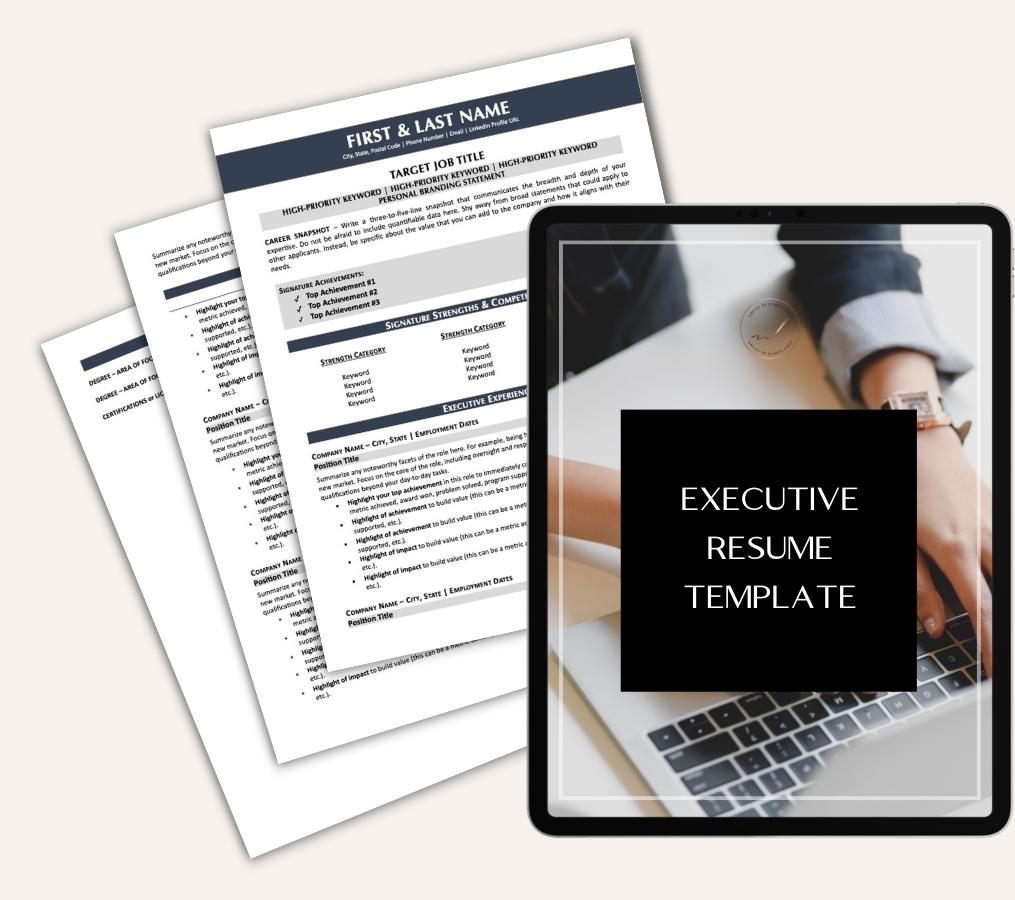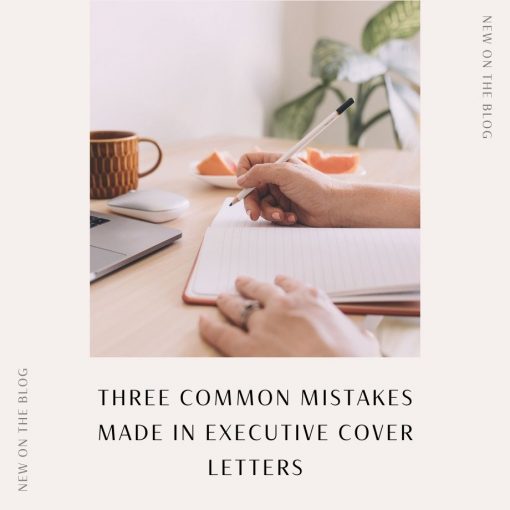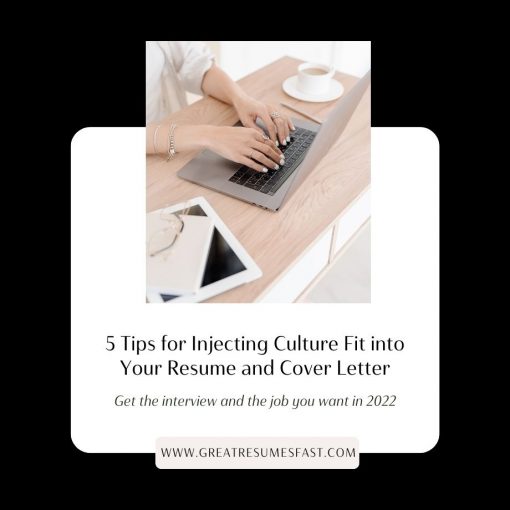5-Step Guide to Writing Executive Cover Letters
Isn’t my resume enough to show my experience and value to a prospective employer? Why do I need an executive cover letter, too? You might be asking yourself these questions as you plunge headlong into a search for a new executive position.
It’s true, it is a lot of work to write a resume—and then another, and another—to ensure each is tailored for the position you’re applying to. But, no matter how much work it may seem like, you still need a strong, effective cover letter to accompany each resume you send out. Executive positions are competitive, and you need to give yourself the upper hand with a persuasive, compelling letter that makes a hiring manager want to read your resume. To help executives in the midst of a job search, I’ve written this guide to cover letters for executives.
Why Executives Need a Strong Cover Letter
A strong cover letter is so important for an executive because you simply cannot convey everything you need or want to in a two-page resume or even a three-page resume. As an executive, you have plenty of professional experience to discuss, and will probably need to leave things off your resume even after you’ve culled down your skills and accomplishments to the most relevant for the targeted position.
When you write a cover letter, you can address accomplishments or work experiences that aren’t directly mentioned in your resume, or expand on the information provided in your resume.
However, a strong cover letter should never just act as an extension of your resume. Instead, a strong executive cover letter should accomplish the goals of telling a prospective employer why you are a good fit for their company, what you can do for them, and why they should pay closer attention to your resume than they might pay to the resume of another applicant. Remember, a recruiter or hiring manager will only spend a few seconds skimming your resume—but a strong executive cover letter will help compel them to spend more time with yours.
As I explain in this article, it’s especially important that you have a strong executive cover letter if you are pitching a company for a job that isn’t posted so you can explain why you are sending your resume and why you think the company could benefit from employing you. Plus, regardless of whether the job is posted or not, two-thirds of hiring managers and executives do read cover letters. Better safe than sorry when it comes to those kinds of numbers.
However, many executives may think that they don’t need a cover letter because they already know the prospective employer who will be reviewing their resume. You may know them, and they may be familiar with your career and your accomplishments—but the same is probably true of other applicants. Don’t take any shortcuts with your career, and don’t make any assumptions about where you stand with a prospective employer.
A strong executive cover letter is important for showing that you care enough about the position to put the effort into writing one—and it’s important for the actual content of the letter itself. As I’ve already mentioned, an executive cover letter needs to communicate your professional personality and why you are a good fit for the position. If you do this, and do it well, your resume is far more likely to get the attention it deserves and get you an interview.
Action verbs and high-impact phrases are equally important in your resume and cover letter. If you need a reference list download this free PDF with 178 action verbs and high-impact phrases that will improve your resume and cover letter.
How a Great Cover Letter Can Help Executives Land a Job
A great cover letter separates the motivated and truly interested candidates from those who are just applying because the job looked like something they’d be qualified for. Yes, it’s necessary to have an executive cover letter in addition to your resume because it’s expected that you have one, but it’s also necessary because it can help you land a job by providing additional, relevant, and interesting information about your experience, your brand, and your interest in the position.
When a hiring manager is considering applicants, they want to know that an applicant is truly invested, or will be truly invested, in the company if hired. A great cover letter will show how and why you will be an asset to the company and encourage a hiring manager to take your resume very seriously.
Overall, a cover letter plays the role of being your introduction and first impression for a recruiter or potential employer. An executive may have so much experience that it is impossible for a hiring manager to be familiar with it all, even if they already know about you in the context of your current position. An effective executive cover letter will share information that the hiring manager may not know, or amplify the information about your years of experience and strengths that they are already familiar with and that are also on your resume.
And you know what? A great cover letter will help you land a job because great cover letters are, simply put, rare. In an article on The Muse, a recruiter admitted that “the vast majority of them stink.”
In my professional experience, I’ve also seen my fair share of terrible cover letters. Working in human resources for large corporations, and now as a professional resume writer, I can tell you that great cover letters are few and far between even at the executive level, and a stellar cover letter will make you stand out from other candidates.
Though it is hard to know how many people will be reading your executive cover letter, it is crucial that you write it as though every important person at the company will be reading it. Even though you should assume that multiple people will eventually read your cover letter, you should still address the cover letter to the contact named in the job description, or to a hiring manager or other appropriate contact that you find online—do not use a generic greeting.
If you write your cover letter to have wide appeal to multiple executives and human resources professionals within the company, it is more likely that something in your background or in your discussion of what you want to do to help the company will resonate with one or more of the decision-makers who are reading your resume and cover letter. Every person whose attention you catch with your cover letter is one more opportunity to have an advocate who wants to call you in for the interview so they can learn more about what you can do for their company as an executive.
Examples of a Great Executive Cover Letter
So now you know that you need an executive cover letter to help you stand out and to help you effectively convey your professional brand to a prospective employer or recruiter. But what makes an executive cover letter memorable? What makes your cover letter effective? What makes a cover letter tell an employer why YOU are the best person for the job?
To begin with, I’ll point you to this article on the Great Resumes Fast blog that includes links to 25+ examples of successful executive cover letters. Here, you’ll find cover letter examples across a variety of industries and positions.
However, I cannot advise you strongly enough against just taking the language from these sample cover letters and plugging in your own information. This is directly contradictory to achieving the goal of making yourself stand out and establishing a personal brand in your executive cover letter. Instead, use these example cover letters as a guide and inspiration for what to include about your own career, or as a general outline for how to organize your cover letter as you write.
If you look at this cover letter example, you’ll notice that it incorporates bullet points and also has a header that describes the applicant’s overall strengths and educational credentials. If appropriate, you may want to follow this format for your executive cover letter—especially if a job description makes clear that education credentials are a crucial qualification for the job. Maybe you never considered using bullet points in a cover letter—many people don’t—but it can be an effective way to get important information across concisely.
And in this sample cover letter, you see how the applicant uses bolded font format to emphasize strengths. He also notes right up front that he is bilingual—a skill that is becoming more and more sought-after at all professional levels. He immediately establishes his value by noting this, and undoubtedly sets himself apart from many of the other applicants a recruiter or hiring manager will be reading about that day. I’ll also call attention to the closing section of the cover letter where the applicant directly addresses that he would like a meeting. Asking for a meeting or interview directly, rather than just closing with a line such as “I look forward to hearing from you,” shows your strong interest in the position, and also demonstrates that you are able and willing to be direct and strong in your communications—traits that are desirable in an executive.
In this example cover letter, for a C-level health care executive, we see a strong, thorough use of keywords. The keywords used in the cover letter are undoubtedly terms that will be looked for by hiring managers and human resources, and his effective use of them up front in the cover letter demonstrates his knowledge of the industry and accomplishments thus far in his career. Using keywords effectively is a different beast than simply throwing in jargon or clichés because you think that’s what a potential employer wants to hear. Trust me, the people reading your resume can tell the difference. You need to be speaking from your personal experience when you’re using these keywords, or pulling them directly from the job description and incorporating them wisely into your experience and the value you can bring to the company.
Using jargon and clichés just for the sake of it is one of the most common mistakes people make in their executive cover letters. Other common mistakes in executive cover letters include regurgitating information that’s in your resume, such as just listing years of experience and job titles, or talking too much about how great you are and what you want from your career without ever connecting it to how that is of value to a potential employer.
How Executives Can Write a Great Cover Letter
Now that you’ve seen examples of effective executive cover letters and we’ve gone through what makes an executive cover letter successful, let’s go through some tips for cover letter success. First, let’s go over some common mistakes and how you can avoid them.
● Don’t use a generic address or greeting line. Yes, the cover letter examples in the previous section do—but those are examples. In a real cover letter you should never have a generic address. It’s the 21st century. If the job description doesn’t tell you who to address your cover letter and resume to, hop on Google, LinkedIn, the company website, etc. to find the name of the hiring manager, head of the department you’re applying to, or the head of human resources and use their name and title.
● Don’t start with one of those blah lines like “Please consider this letter and resume…” They know what they’re reading, and you’re wasting valuable space by telling them why you sent it in. Instead, start off your cover letter strong. A question makes a strong start—something like “Would Company ABC benefit from having a proven sales leader in their C-suite?” Another strong way to start a cover letter is by immediately jumping into your strongest and most relevant skills or qualifications—something along the lines of, “As a senior vice president with XYZ Bank, I improved performance by XYZ% and would now like to put my knowledge and experience to use to do the same for Company ABC.” Get their attention immediately.
● Don’t fall into the trap of reiterating the same information they will see on your resume. Doing so might be an easy way to fill up a page and just have a cover letter to fulfill that requirement of an application, but it doesn’t do any good, especially at the executive level where you should have plenty more to discuss in a cover letter.
● Don’t fill in the blanks of a cover letter template. If you’ve wondered how important it is to have a cover letter template to help you write an effective cover letter, the answer is— it’s not. Use one for inspiration or as a very basic guide, or find a sample cover letter to do the same. But absolutely do not take a template and just fill in the blanks. At the executive level, it reflects incredibly poorly on you and will quite possibly do more harm than good.
Those are the basic don’ts that you need to avoid while writing an executive cover letter. Let’s move to the tips for what you can do to help write a successful executive cover letter.
● Do research the company before you start writing. Look for information on their culture, those words and phrases that crop up regularly on their website and LinkedIn and about pages of their employees. Link yourself and your career history and goals to their company culture to show why you would be a good fit as an executive and as a leader.
● Do use the same concept of white space for easy reading and skimming that you apply to your resume format. Bullet points, short paragraphs, and a clean and modern font will help ensure that a prospective employer doesn’t get a headache from your cover letter before they’ve even begun to read it.
● Do provide tangible examples to back up your claims of skills and strengths. If you open the letter by calling yourself a strong leader or experienced sales executive, provide an anecdote or numbers to back up that claim. You’ll be doing this in your resume, but in your cover letter you can more clearly explain how you approached and overcame a specific problem, or what methods or strategies you used to increase sales numbers.
● Do keep it to one page. While an executive resume can certainly extend beyond one page, your cover letter should not. Write as concisely as possible, and address your strongest points in a cover letter.
● Do let your own voice shine through. While incorporating keywords and speaking to company culture is important for a successful cover letter, you don’t want to sound like a corporate robot or like you are copying and pasting from their website—or from a template. Instead, you want to show your unique professional brand. Try writing a draft without consciously incorporating keywords, and then go back in and revise to include them. In this way, your voice will be more naturally included.
● Do close with a call to action. Be strong and assertive (but of course still polite and professional) and ask for a meeting or interview. Don’t leave it up to them by just saying “I hope to hear from you” or “Please be in touch if you have any questions.” Be clear about what you want: an interview.
For a step-by-step guide to writing a strong executive cover letter, check out this article on the Great Resumes Fast Blog.
Share this post:

About the author
Jessica Hernandez, President, CEO & Founder of Great Resumes Fast
Hi, I’m Jessica. I started this company back in 2008 after more than a decade directing hiring practices at Fortune 500 companies.
What started as a side hustle (before that was even a word!) helping friends of friends with their resumes has now grown into a company that serves hundreds of happy clients a year. But the personal touch? I’ve kept that.
You might have seen me featured as a resume expert in publications like Forbes, Fast Company, and Fortune. And in 2020, I was honored to be named as a LinkedIn Top Voice of the year!
I’m so glad you’re here, and I can’t wait to help you find your next perfect-fit position!
8 Comments
Leave a Comment
Improve Your Resume: Download Your Free Executive Resume Template Today
Are you struggling to create an executive resume that will impress employers? Download this free executive resume template and receive a series of 10 emails with expert guidance on how to write resume content that resonates with employers so you get more interviews.
It's everything you need to stand out, make an impression, and accelerate your job search.









[…] post 5-Step Guide to Writing Cover Letters for Executives appeared first on Blog | Great Resumes […]
Hi Jessia, Thanks for being a helping hand to career aspirants.Kudos to your ingenuity and benevolence. Keep writing like this!
https://www.careersbooster.com/
[…] to write an effective cover letter to help you land an interview and a job, check out this article: 5-Step Guide to Writing Cover Letters for Executives. The article also includes links to cover letter samples that you might find useful when trying to […]
I have read these Guide to Writing Cover Letters for Executives. Thanks for sharing the great information about the professional resume and cover letters.
It’s a very good blog and the message will useful for someone good way of presentation and the content presentation is also good, keep blogging and give some good contents. I heard about INICIO Jobs App it has a lot of vacancies for freshers and experienced employees.
[…] ● 5 Step Guide To Writing Cover Letters For Executives ● Grab Attention With A Compelling Cover Letter ● 5 Tips For Injecting Culture Fit Into Your Resume and Cover Letter ● How To Write A Cover Letter Recruiters Will Read ● 3 Secrets To Interview-Winning Cover Letters […]
Nice article, There are good techniques that you can use just like 501 words. These are some of the practices that you can adopt while you’re in the process of writing. There are other things which can help you to increase your effectivity. But essentially, these tips are sufficient enough to develop good writing habits.
Thanks!